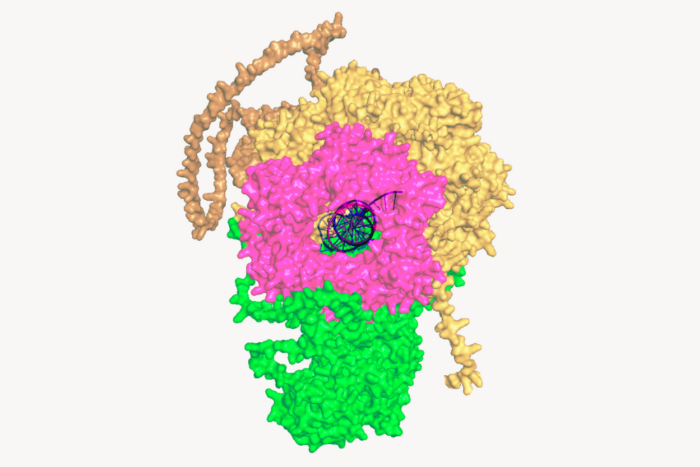Lewis Thomas Prize to honor mathematicians Steven Strogatz and Ian Stewart
Two mathematicians, Ian Stewart and Steven Strogatz, will share the 2015 Lewis Thomas Prize for Writing about Science awarded by The Rockefeller University. Stewart, from The University of Warwick and Gresham College in the United Kingdom, and Strogatz, from Cornell, are the first mathematicians to receive the prize. They will be honored during a program featuring actor Alan Alda, an advocate for science, on Monday, March 30, in Rockefeller’s Caspary Auditorium.

Prize winners Ian Stewart (left) and Steven Strogatz (right)
Established by the University’s Board of Trustees in 1993, the prize honors “the rare individual who bridges the worlds of science and the humanities — whose voice and vision can tell us about science’s aesthetic and philosophical dimensions, providing not merely new information but cause for reflection, even revelation.” It is named after its first recipient, writer, educator and physician-scientist Lewis Thomas.
“This year, we are delighted to honor two accomplished writers from the discipline that represents the language of science — mathematics,” says Jesse Ausubel, director of the Program for the Human Environment and chairman of the selection committee. “Not only are Stewart and Strogatz both distinguished mathematicians, their books and essays have a dimension of inspiration that embodies the purpose of the Lewis Thomas Prize. And they have worked together. In 1993 they co-authored a widely read paper on coupled oscillators and biological synchronization.”
Stewart received his bachelor’s and master’s degrees from Churchill College, Cambridge, and completed his doctorate at The University of Warwick. He is an emeritus professor of mathematics at The University of Warwick and emeritus professor of geometry at Gresham College, in London.
Stewart has written more than 80 books, including several bestsellers. His popular work explores the power, beauty, and fun in mathematics, often with a historical perspective. His recent book In Pursuit of the Unknown: 17 Equations that Changed the World gives an account of mathematical discoveries that have contributed to human progress, from Pythagoras’ Theorem to the Black-Scholes Equation. His other recent publications include Visions of Infinity: The Great Mathematical Problems and Symmetry: A Very Short Introduction. Stewart has also written science fiction books and short stories. In addition to many broadcast appearances and contributions to print publications, Stewart has served as a mathematics consultant for New Scientist and Encyclopaedia Britannica.
With over 180 published research papers, he remains an active research mathematician, currently working on pattern formation, chaos, network dynamics, and biomathematics. Stewart’s awards include the Royal Society’s Faraday Medal, IMA Gold Medal, American Association for the Advancement of Science Public Understanding of Science and Technology Award, LMS/IMA Zeeman Medal, and, jointly with Martin Golubitsky, the Balaguer Prize. Stewart was elected a Fellow of the Royal Society in 2001. Stewart is also the author or co-author of influential research texts including Galois Theory, The Symmetry Perspective, Singularities and Groups in Bifurcation Theory, and Catastrophe Theory and Its Applications.
Strogatz graduated from Princeton in 1980 and then studied at Trinity College, Cambridge, as a Marshall Scholar. He completed his doctoral work in applied mathematics at Harvard University, followed by a National Science Foundation postdoctoral fellowship at Harvard and Boston University. From 1989 to 1994, Strogatz taught in the Department of Mathematics at the Massachusetts Institute of Technology. In 1994, he joined the Cornell faculty, where he is now a professor of applied mathematics.
Strogatz opened a series of columns in The New York Times with a fundamental question: What are numbers? Building upon these essays, his book The Joy of x takes readers from such basics to the questions tackled by modern mathematicians. He is also the author of Nonlinear Dynamics and Chaos, Sync, and The Calculus of Friendship, and a frequent guest on public radio’s Radiolab and Science Friday.
Early in his career as a mathematician, Strogatz worked on problems in mathematical biology, including the geometry of supercoiled DNA and the collective behavior of biological oscillators — the topic of a Scientific American piece he coauthored with Stewart in 1993. In a highly cited 1998 Nature paper written with Duncan Watts, also at Cornell, Strogatz made perhaps his best-known contribution to the field by introducing the concept of “small-world” networks, in which most nodes are only a few steps away from one another.
His awards include the Presidential Young Investigator Award from the National Science Foundation, MIT’s E. M. Baker Award for Excellence in Undergraduate Teaching, Communications Award from the Joint Policy Board for Mathematics, lifetime achievement award for the communication of mathematics to the general public, and American Association for the Advancement of Science Public Engagement with Science Award, among many others. Strogatz was elected a Fellow of the Society for Industrial and Applied Mathematics in 2009 and a Fellow of the American Academy of Arts and Sciences in 2012.
“Both mathematicians are well known for their work on dynamical systems, including geometric and qualitative ways to understand the time evolution of solutions of differential equations,” says Eric Siggia, Viola Ward Brinning and Elbert Calhoun Brinning Professor and head of the Laboratory of Theoretical Condensed Matter Physics, who consulted with the prize committee along with two other Rockefeller mathematicians. “This line of research is motivated by questions such as those about the long-term stability of planetary orbits in the solar system, and the tendency of independent oscillating systems to synchronize.”
“At its inception, the Lewis Thomas Prize recognized the scientist as poet. Although the title has since been changed, the writing of both Dr. Stewart and Dr. Strogatz evokes this initial intent by, for example, breathing life into a piece of mathematics history or conveying a concept in an elegant essay,” Ausubel says. “Each has shared his inspired take on mathematics with enormous numbers of people.”
Recent winners of the Lewis Thomas Prize include surgeon Atul Gawande, neurologist Oliver Sacks, ecologist E.O. Wilson, and cosmologist and astrophysicist Martin Rees.
A reception will be held at 5 pm on Monday, March 30, in the Abby Aldrich Rockefeller Lounge followed at 6 pm by the award program with Stewart, Strogatz, and Alda. The evening’s events are open to the public.


